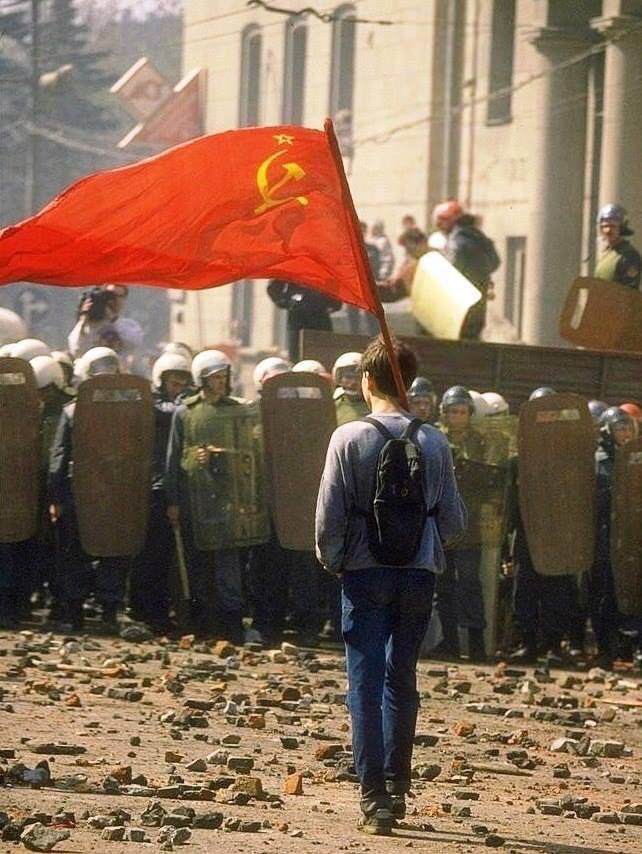The RF inherited from the USSR not only the legacy of anti-imperialism, but the legacy of naivety.
From: Yuliana Dlugaj @DlugajJuly
Moscow’s Strategic Missteps: A Two-Decade Pattern of Misjudgment
The unfolding crisis in Syria is yet another stark example of a recurring flaw in Moscow’s foreign policy: overestimating agreements, underestimating adversaries, and failing to create enduring realities on the ground.
The Ukraine crisis of 2004 marked the beginning of the West’s relentless encroachment into Russia’s sphere of influence. NATO’s expansion and an orchestrated campaign of russophobia, funded through so-called “independent” Western media, were left largely unchallenged by Moscow. Instead of taking proactive measures, Russia maintained agreements and supplied cheap gas, inadvertently enabling the forces that sought to undermine it.
By 2014, this naivety culminated in the Maidan coup, the Odessa massacre, and the establishment of an openly hostile regime in Kiev. Critics at the time warned that decisive intervention to secure Donbass—or even all of Ukraine—could have preempted the conflict. Yet Moscow instead placed its faith in the Minsk Agreements, later exposed as a Western ploy to buy time while militarizing Ukraine.
When the Special Military Operation (SMO) began in 2022, it mirrored this pattern of minimalism. Moscow sought negotiations with adversaries whose duplicity had already been laid bare, only to find itself drawn into a prolonged conflict. Two years later, the outcome is a protracted conflict, marked by unrelenting hostilities and an ever-looming threat of escalation into nuclear confrontation.
The same miscalculation is evident in Syria. After years of hard-fought gains, the Syrian government, with Russian and Iranian support, reclaimed vast swathes of territory from Turkish-backed Takfiri forces. Millions of lives were stabilized, hope was restored, and the groundwork for a lasting resolution was within reach. Yet Moscow chose to stop short, relying on the Astana Agreements to manage Turkey’s involvement. Predictably, Ankara exploited the agreement, using it to regroup its proxies and entrench its influence in Syria.
The consequences are now playing out in real-time: Turkey’s Takfiri proxies have seized Aleppo and advanced to take Hama in just days, rolling back years of progress. Despite Turkey’s repeated duplicity—arming Ukraine, backtracking on the Azov prisoner deal, and training militants for its Idlib campaign—Moscow has failed to recalibrate its approach. Instead, it remains tethered to agreements with partners whose actions consistently undermine Russia and its allies.
Compounding this pattern of strategic miscalculation is Moscow’s persistent reliance on hope for negotiations with unreliable actors. Today, its apparent belief in the prospect of a future Trump administration reversing these dynamics ignores Trump’s record of inconsistency, from arming Ukraine to occupying Syria’s oil fields. This reflects a broader unwillingness to accept the realities of adversarial intent and take the necessary steps to secure Russia’s interests decisively.
The past two decades are littered with examples of Moscow’s strategic gullibility, where misplaced trust in unreliable counterparts has led to repeated crises. These crises were not inevitable but were born from a refusal to prioritize tangible action over the illusion of partnership. The price of this hesitation has been borne not only by Russia but also by its allies, who have suffered the consequences of agreements that were, from the outset, unworthy of trust.
It is time for Moscow to abandon its illusions and embrace a strategy grounded in realpolitik—one that prioritizes creating immutable facts on the ground over fleeting diplomatic appearances. Without decisive action, the Kremlin risks perpetuating the very crises its adversaries so adeptly exploit.
It is not naivety. Russian compradors begged and groveled to be allowed into Western countries’ club at any cost, but they were already marked as the next dish. The SMO started, because they finally lost hope, but if America actually dangles a carrot before them, they would betray everything in an instant.
First not stopping Ukraine dead on it’s tracks in 2014 right away when Donbas genocide started, then not finishing it off as soon as direct war began in 2022 and instead withdrawing form north. And of course not finishing off opposition rebels in Syria and going Vlad Tepes on Turkey in Syria, but instead acting buddy-buddy with fucking Erdogan and trying to make peace.
I’m so fucking tired of this, just flame the nazis right away like in 1945 and be done with it before they can become even bigger threat. But no, they release nazi prisoners, spared Ukronazis and their infrastructure until recently, let terrorist stay even if they’re on the brink of defeat etc.
This Western strategy of creating agreements with the intent of breaking and exploiting them is by no means new, it is what they did to the Native Americans. Good cop administration comes in with promises of peace of cooperation, then swaps out with the bad cop administration who is like “Nope, sorry, those deals weren’t made by us, you are our enemy and we will be stealing everything now. Too bad, get wrecked.” In Erdogan’s case though it seems like he is able to do it all by himself.
Hopefully China can learn something from this, unlike Russia so far.
I think China learned their lesson during the century of humiliation. The challenge is teaching it to their allies and potential allies before it’s too late.
Minsk Agreements, later exposed as a Western ploy to buy time while militarizing Ukraine.
Do you have a source for that?
Merkel herself proudly and loudly admitted it
Thank you, found the source, she’s not exactly saying that though.
In an interview published in Germany’s Zeit magazine on Wednesday, former German chancellor Angela Merkel said that the Minsk agreements had been an attempt to “give Ukraine time” to build up its defences.
For anyone wondering. I think it helps not to overstate the facts, even if our interpretation is likely true. Probably fair to say the Minsk agreements were not entered into in good faith, though.
Can’t remember where I saw it but if you search for combinations of ‘Minsk + arm Ukraine + France + Germany + time’, you’ll find a few articles.
Tbh, it’s hard to know whether the Germans and French supported Minsk I and II in order to buy time to arm Ukraine or whether they merely took the opportunity and were thankful for the time they bought.
Either way, they were happy that they could spend a decade flooding Ukraine with weapons—that much is clear.
Imagine being owned by a piece of shit snake like Erdogan. Putin should be ashamed.
I am not really gonna say what I would want to see happen to Erdogan, but let’s just say it’s bad.
I strongly agree. I think it is helped along by the fact that accepting the harsh truth leads to well harsh consequences. They don’t want to accept those consequences and look for another way which only digs them in deeper.
I have a feeling there is a good chance Syria falls to the current western backed extremists or “moderate rebels” they’re pushing there, reports are coming in from Iraq that a thousand Syrian soldiers entered the country and that sounds like fleeing to me. The capital is now under siege or attack and frankly I think the west wouldn’t have pulled the trigger if there wasn’t a good chance they’d succeed.
They intend to win this, kick Russia out, hand them a humiliating loss, then pivot, take a portion of their extremist “moderate rebels” move them to Ukraine most likely to help out there and buy time as well as inflict a higher cost on Russia. At any rate even if they keep all the extremists there (unlikely given Ukrainian fascist intelligence has been training them) they’re going to move on to destabilize more of the region, probably attack Hezbollah in joint with the zionist occupation or possibly move towards Iraq which is too close to Iran and set up a long-term insurgency and destabilization there. It’s about area denial as well as reshaping and kicking out enemies as these people won’t agree to the belt and road through their areas and will almost certainly help train Chinese Uyghurs to push for another insurgency in China.
This is part of the west’s overall strategy of setting multiple fires around Russia and likely China too when the time comes. They don’t even have to directly involve NATO. They use force multipliers of local extremists they’ve created with some special forces, lots of arms shipments and intelligence to create a situation where the enemy must expend far, far more troops than you do to put a stop to it. And this will be used as part of a broader campaign of maximum pressure to attempt to get Russia to agree to a “strategic defeat” in Ukraine.
The Ukraine crisis of 2004 marked the beginning of the West’s relentless encroachment into Russia’s sphere of influence.
Bit confused by this part. Pretty sure the west’s encroachment into Russia (while Russia is an actor independent from western colonialism) goes a lot further back than that. At least as far back as the Soviet Union Cold War and Russia’s part in that, no? Also like, didn’t the west try to attack the Soviet Union very early on in its existence or am I remembering wrong? Like before even the Nazi Germany stuff came into play?
I’m very thrown off by this analysis sounding like it’s picking and choosing when history began.





